Importance of Employability Skills in Recruitment
VerifiedAdded on 2023/06/14
|11
|4399
|393
AI Summary
This report discusses the importance of employability skills in recruitment and the impact of these skills on job seekers. It also highlights the types of employability skills important for employers and the importance of soft skills in the workplace.
Contribute Materials
Your contribution can guide someone’s learning journey. Share your
documents today.
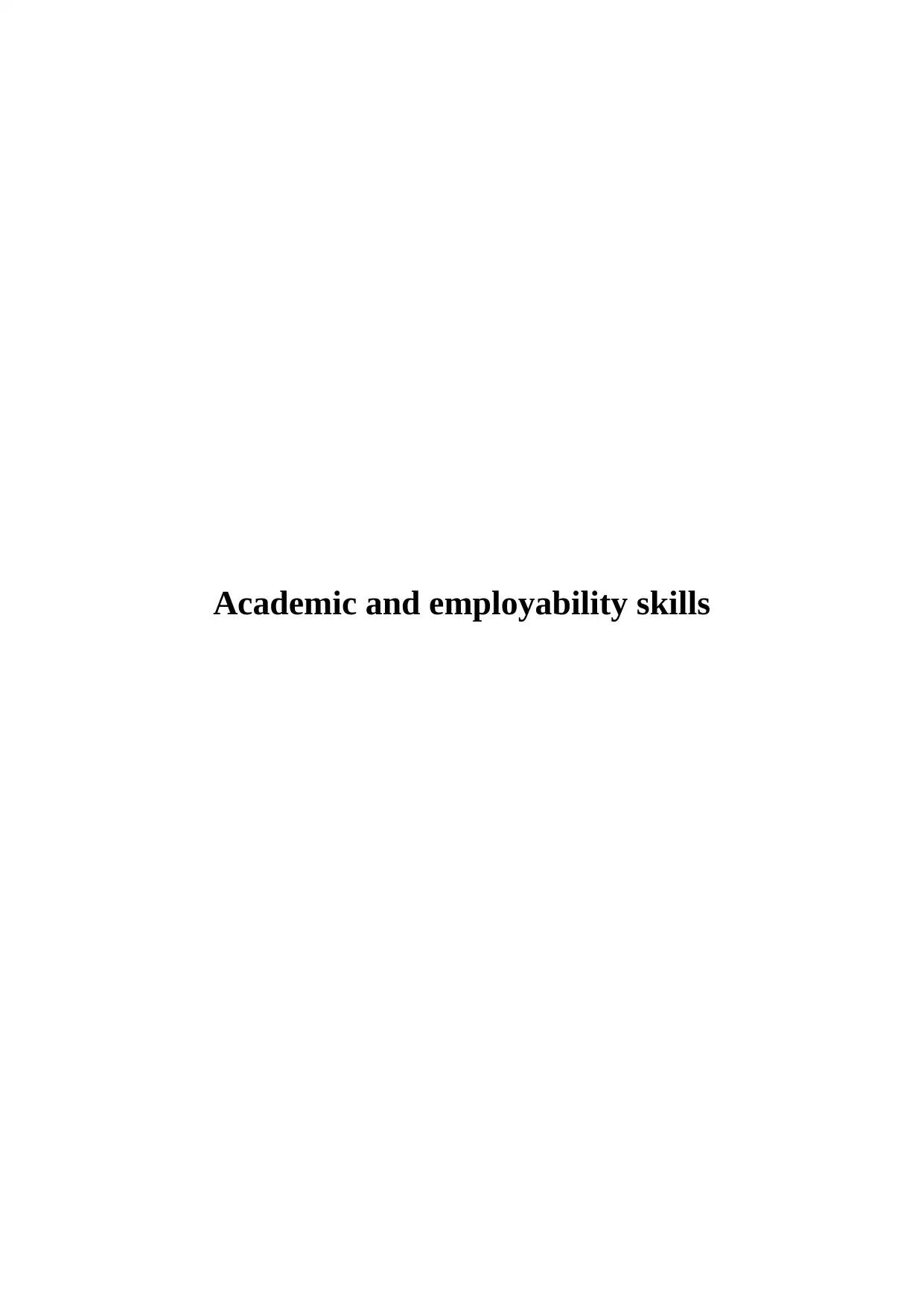
Academic and employability skills
Secure Best Marks with AI Grader
Need help grading? Try our AI Grader for instant feedback on your assignments.
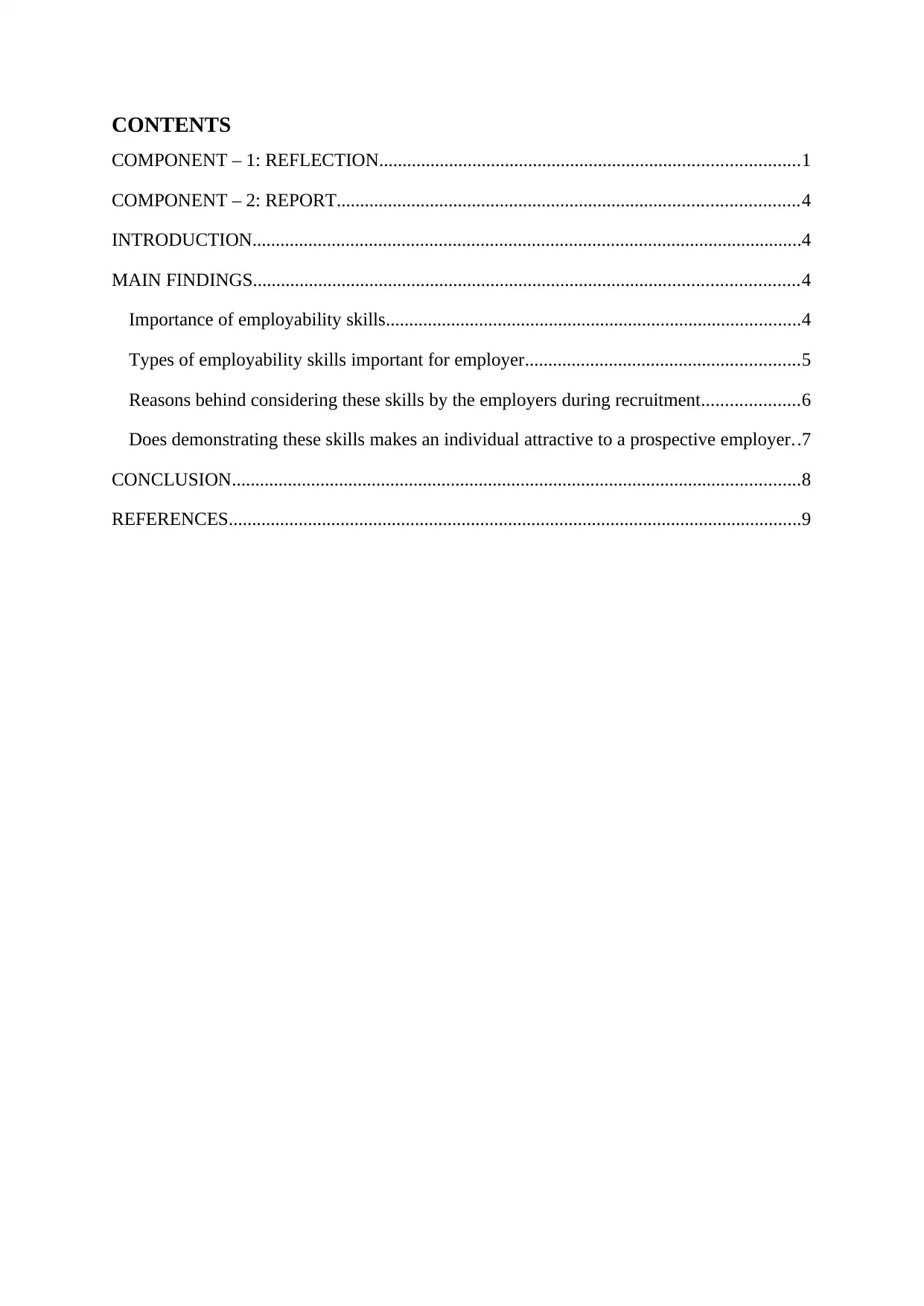
CONTENTS
COMPONENT – 1: REFLECTION..........................................................................................1
COMPONENT – 2: REPORT...................................................................................................4
INTRODUCTION......................................................................................................................4
MAIN FINDINGS.....................................................................................................................4
Importance of employability skills.........................................................................................4
Types of employability skills important for employer...........................................................5
Reasons behind considering these skills by the employers during recruitment.....................6
Does demonstrating these skills makes an individual attractive to a prospective employer..7
CONCLUSION..........................................................................................................................8
REFERENCES...........................................................................................................................9
COMPONENT – 1: REFLECTION..........................................................................................1
COMPONENT – 2: REPORT...................................................................................................4
INTRODUCTION......................................................................................................................4
MAIN FINDINGS.....................................................................................................................4
Importance of employability skills.........................................................................................4
Types of employability skills important for employer...........................................................5
Reasons behind considering these skills by the employers during recruitment.....................6
Does demonstrating these skills makes an individual attractive to a prospective employer..7
CONCLUSION..........................................................................................................................8
REFERENCES...........................................................................................................................9
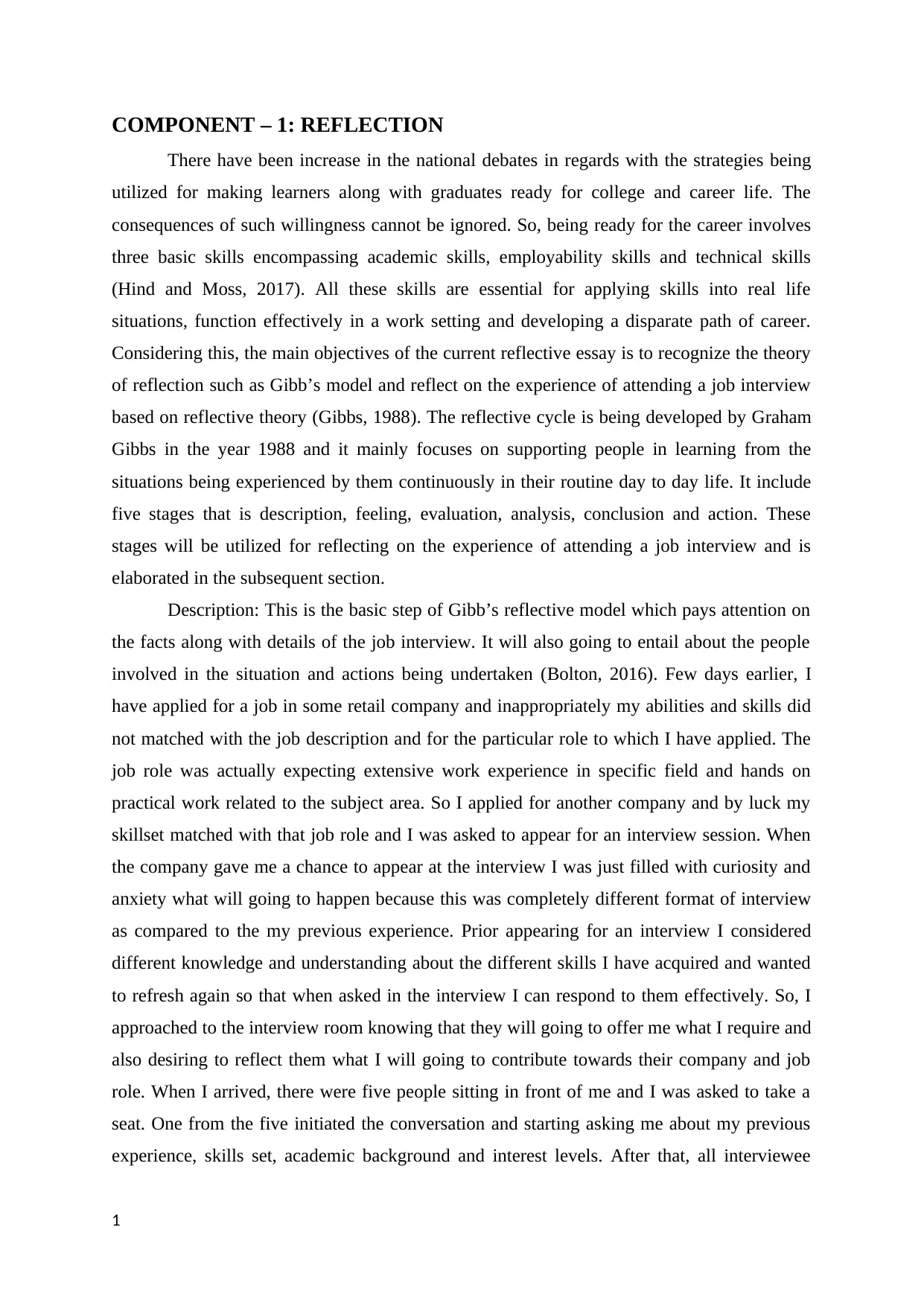
COMPONENT – 1: REFLECTION
There have been increase in the national debates in regards with the strategies being
utilized for making learners along with graduates ready for college and career life. The
consequences of such willingness cannot be ignored. So, being ready for the career involves
three basic skills encompassing academic skills, employability skills and technical skills
(Hind and Moss, 2017). All these skills are essential for applying skills into real life
situations, function effectively in a work setting and developing a disparate path of career.
Considering this, the main objectives of the current reflective essay is to recognize the theory
of reflection such as Gibb’s model and reflect on the experience of attending a job interview
based on reflective theory (Gibbs, 1988). The reflective cycle is being developed by Graham
Gibbs in the year 1988 and it mainly focuses on supporting people in learning from the
situations being experienced by them continuously in their routine day to day life. It include
five stages that is description, feeling, evaluation, analysis, conclusion and action. These
stages will be utilized for reflecting on the experience of attending a job interview and is
elaborated in the subsequent section.
Description: This is the basic step of Gibb’s reflective model which pays attention on
the facts along with details of the job interview. It will also going to entail about the people
involved in the situation and actions being undertaken (Bolton, 2016). Few days earlier, I
have applied for a job in some retail company and inappropriately my abilities and skills did
not matched with the job description and for the particular role to which I have applied. The
job role was actually expecting extensive work experience in specific field and hands on
practical work related to the subject area. So I applied for another company and by luck my
skillset matched with that job role and I was asked to appear for an interview session. When
the company gave me a chance to appear at the interview I was just filled with curiosity and
anxiety what will going to happen because this was completely different format of interview
as compared to the my previous experience. Prior appearing for an interview I considered
different knowledge and understanding about the different skills I have acquired and wanted
to refresh again so that when asked in the interview I can respond to them effectively. So, I
approached to the interview room knowing that they will going to offer me what I require and
also desiring to reflect them what I will going to contribute towards their company and job
role. When I arrived, there were five people sitting in front of me and I was asked to take a
seat. One from the five initiated the conversation and starting asking me about my previous
experience, skills set, academic background and interest levels. After that, all interviewee
1
There have been increase in the national debates in regards with the strategies being
utilized for making learners along with graduates ready for college and career life. The
consequences of such willingness cannot be ignored. So, being ready for the career involves
three basic skills encompassing academic skills, employability skills and technical skills
(Hind and Moss, 2017). All these skills are essential for applying skills into real life
situations, function effectively in a work setting and developing a disparate path of career.
Considering this, the main objectives of the current reflective essay is to recognize the theory
of reflection such as Gibb’s model and reflect on the experience of attending a job interview
based on reflective theory (Gibbs, 1988). The reflective cycle is being developed by Graham
Gibbs in the year 1988 and it mainly focuses on supporting people in learning from the
situations being experienced by them continuously in their routine day to day life. It include
five stages that is description, feeling, evaluation, analysis, conclusion and action. These
stages will be utilized for reflecting on the experience of attending a job interview and is
elaborated in the subsequent section.
Description: This is the basic step of Gibb’s reflective model which pays attention on
the facts along with details of the job interview. It will also going to entail about the people
involved in the situation and actions being undertaken (Bolton, 2016). Few days earlier, I
have applied for a job in some retail company and inappropriately my abilities and skills did
not matched with the job description and for the particular role to which I have applied. The
job role was actually expecting extensive work experience in specific field and hands on
practical work related to the subject area. So I applied for another company and by luck my
skillset matched with that job role and I was asked to appear for an interview session. When
the company gave me a chance to appear at the interview I was just filled with curiosity and
anxiety what will going to happen because this was completely different format of interview
as compared to the my previous experience. Prior appearing for an interview I considered
different knowledge and understanding about the different skills I have acquired and wanted
to refresh again so that when asked in the interview I can respond to them effectively. So, I
approached to the interview room knowing that they will going to offer me what I require and
also desiring to reflect them what I will going to contribute towards their company and job
role. When I arrived, there were five people sitting in front of me and I was asked to take a
seat. One from the five initiated the conversation and starting asking me about my previous
experience, skills set, academic background and interest levels. After that, all interviewee
1
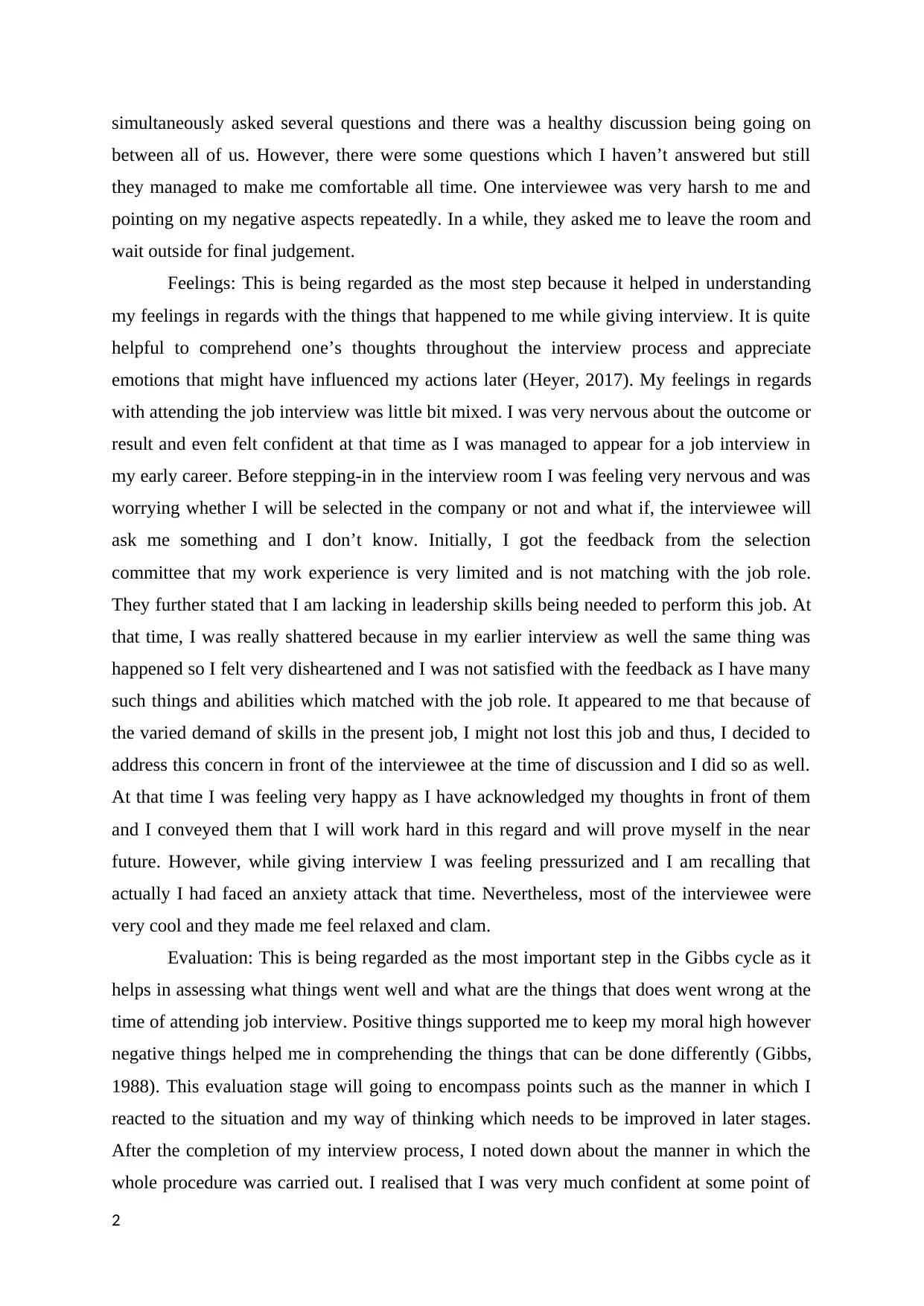
simultaneously asked several questions and there was a healthy discussion being going on
between all of us. However, there were some questions which I haven’t answered but still
they managed to make me comfortable all time. One interviewee was very harsh to me and
pointing on my negative aspects repeatedly. In a while, they asked me to leave the room and
wait outside for final judgement.
Feelings: This is being regarded as the most step because it helped in understanding
my feelings in regards with the things that happened to me while giving interview. It is quite
helpful to comprehend one’s thoughts throughout the interview process and appreciate
emotions that might have influenced my actions later (Heyer, 2017). My feelings in regards
with attending the job interview was little bit mixed. I was very nervous about the outcome or
result and even felt confident at that time as I was managed to appear for a job interview in
my early career. Before stepping-in in the interview room I was feeling very nervous and was
worrying whether I will be selected in the company or not and what if, the interviewee will
ask me something and I don’t know. Initially, I got the feedback from the selection
committee that my work experience is very limited and is not matching with the job role.
They further stated that I am lacking in leadership skills being needed to perform this job. At
that time, I was really shattered because in my earlier interview as well the same thing was
happened so I felt very disheartened and I was not satisfied with the feedback as I have many
such things and abilities which matched with the job role. It appeared to me that because of
the varied demand of skills in the present job, I might not lost this job and thus, I decided to
address this concern in front of the interviewee at the time of discussion and I did so as well.
At that time I was feeling very happy as I have acknowledged my thoughts in front of them
and I conveyed them that I will work hard in this regard and will prove myself in the near
future. However, while giving interview I was feeling pressurized and I am recalling that
actually I had faced an anxiety attack that time. Nevertheless, most of the interviewee were
very cool and they made me feel relaxed and clam.
Evaluation: This is being regarded as the most important step in the Gibbs cycle as it
helps in assessing what things went well and what are the things that does went wrong at the
time of attending job interview. Positive things supported me to keep my moral high however
negative things helped me in comprehending the things that can be done differently (Gibbs,
1988). This evaluation stage will going to encompass points such as the manner in which I
reacted to the situation and my way of thinking which needs to be improved in later stages.
After the completion of my interview process, I noted down about the manner in which the
whole procedure was carried out. I realised that I was very much confident at some point of
2
between all of us. However, there were some questions which I haven’t answered but still
they managed to make me comfortable all time. One interviewee was very harsh to me and
pointing on my negative aspects repeatedly. In a while, they asked me to leave the room and
wait outside for final judgement.
Feelings: This is being regarded as the most step because it helped in understanding
my feelings in regards with the things that happened to me while giving interview. It is quite
helpful to comprehend one’s thoughts throughout the interview process and appreciate
emotions that might have influenced my actions later (Heyer, 2017). My feelings in regards
with attending the job interview was little bit mixed. I was very nervous about the outcome or
result and even felt confident at that time as I was managed to appear for a job interview in
my early career. Before stepping-in in the interview room I was feeling very nervous and was
worrying whether I will be selected in the company or not and what if, the interviewee will
ask me something and I don’t know. Initially, I got the feedback from the selection
committee that my work experience is very limited and is not matching with the job role.
They further stated that I am lacking in leadership skills being needed to perform this job. At
that time, I was really shattered because in my earlier interview as well the same thing was
happened so I felt very disheartened and I was not satisfied with the feedback as I have many
such things and abilities which matched with the job role. It appeared to me that because of
the varied demand of skills in the present job, I might not lost this job and thus, I decided to
address this concern in front of the interviewee at the time of discussion and I did so as well.
At that time I was feeling very happy as I have acknowledged my thoughts in front of them
and I conveyed them that I will work hard in this regard and will prove myself in the near
future. However, while giving interview I was feeling pressurized and I am recalling that
actually I had faced an anxiety attack that time. Nevertheless, most of the interviewee were
very cool and they made me feel relaxed and clam.
Evaluation: This is being regarded as the most important step in the Gibbs cycle as it
helps in assessing what things went well and what are the things that does went wrong at the
time of attending job interview. Positive things supported me to keep my moral high however
negative things helped me in comprehending the things that can be done differently (Gibbs,
1988). This evaluation stage will going to encompass points such as the manner in which I
reacted to the situation and my way of thinking which needs to be improved in later stages.
After the completion of my interview process, I noted down about the manner in which the
whole procedure was carried out. I realised that I was very much confident at some point of
2
Secure Best Marks with AI Grader
Need help grading? Try our AI Grader for instant feedback on your assignments.
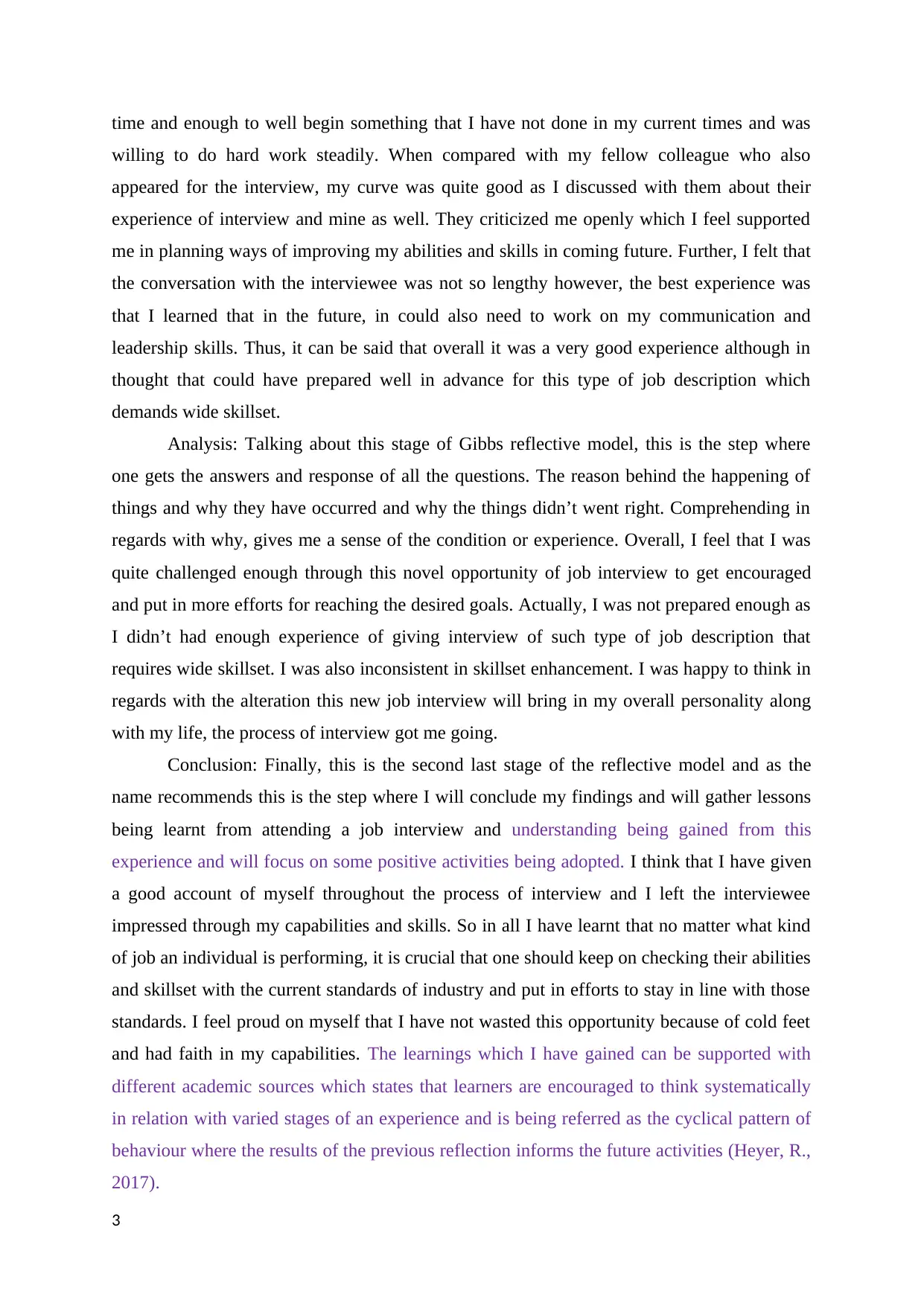
time and enough to well begin something that I have not done in my current times and was
willing to do hard work steadily. When compared with my fellow colleague who also
appeared for the interview, my curve was quite good as I discussed with them about their
experience of interview and mine as well. They criticized me openly which I feel supported
me in planning ways of improving my abilities and skills in coming future. Further, I felt that
the conversation with the interviewee was not so lengthy however, the best experience was
that I learned that in the future, in could also need to work on my communication and
leadership skills. Thus, it can be said that overall it was a very good experience although in
thought that could have prepared well in advance for this type of job description which
demands wide skillset.
Analysis: Talking about this stage of Gibbs reflective model, this is the step where
one gets the answers and response of all the questions. The reason behind the happening of
things and why they have occurred and why the things didn’t went right. Comprehending in
regards with why, gives me a sense of the condition or experience. Overall, I feel that I was
quite challenged enough through this novel opportunity of job interview to get encouraged
and put in more efforts for reaching the desired goals. Actually, I was not prepared enough as
I didn’t had enough experience of giving interview of such type of job description that
requires wide skillset. I was also inconsistent in skillset enhancement. I was happy to think in
regards with the alteration this new job interview will bring in my overall personality along
with my life, the process of interview got me going.
Conclusion: Finally, this is the second last stage of the reflective model and as the
name recommends this is the step where I will conclude my findings and will gather lessons
being learnt from attending a job interview and understanding being gained from this
experience and will focus on some positive activities being adopted. I think that I have given
a good account of myself throughout the process of interview and I left the interviewee
impressed through my capabilities and skills. So in all I have learnt that no matter what kind
of job an individual is performing, it is crucial that one should keep on checking their abilities
and skillset with the current standards of industry and put in efforts to stay in line with those
standards. I feel proud on myself that I have not wasted this opportunity because of cold feet
and had faith in my capabilities. The learnings which I have gained can be supported with
different academic sources which states that learners are encouraged to think systematically
in relation with varied stages of an experience and is being referred as the cyclical pattern of
behaviour where the results of the previous reflection informs the future activities (Heyer, R.,
2017).
3
willing to do hard work steadily. When compared with my fellow colleague who also
appeared for the interview, my curve was quite good as I discussed with them about their
experience of interview and mine as well. They criticized me openly which I feel supported
me in planning ways of improving my abilities and skills in coming future. Further, I felt that
the conversation with the interviewee was not so lengthy however, the best experience was
that I learned that in the future, in could also need to work on my communication and
leadership skills. Thus, it can be said that overall it was a very good experience although in
thought that could have prepared well in advance for this type of job description which
demands wide skillset.
Analysis: Talking about this stage of Gibbs reflective model, this is the step where
one gets the answers and response of all the questions. The reason behind the happening of
things and why they have occurred and why the things didn’t went right. Comprehending in
regards with why, gives me a sense of the condition or experience. Overall, I feel that I was
quite challenged enough through this novel opportunity of job interview to get encouraged
and put in more efforts for reaching the desired goals. Actually, I was not prepared enough as
I didn’t had enough experience of giving interview of such type of job description that
requires wide skillset. I was also inconsistent in skillset enhancement. I was happy to think in
regards with the alteration this new job interview will bring in my overall personality along
with my life, the process of interview got me going.
Conclusion: Finally, this is the second last stage of the reflective model and as the
name recommends this is the step where I will conclude my findings and will gather lessons
being learnt from attending a job interview and understanding being gained from this
experience and will focus on some positive activities being adopted. I think that I have given
a good account of myself throughout the process of interview and I left the interviewee
impressed through my capabilities and skills. So in all I have learnt that no matter what kind
of job an individual is performing, it is crucial that one should keep on checking their abilities
and skillset with the current standards of industry and put in efforts to stay in line with those
standards. I feel proud on myself that I have not wasted this opportunity because of cold feet
and had faith in my capabilities. The learnings which I have gained can be supported with
different academic sources which states that learners are encouraged to think systematically
in relation with varied stages of an experience and is being referred as the cyclical pattern of
behaviour where the results of the previous reflection informs the future activities (Heyer, R.,
2017).
3
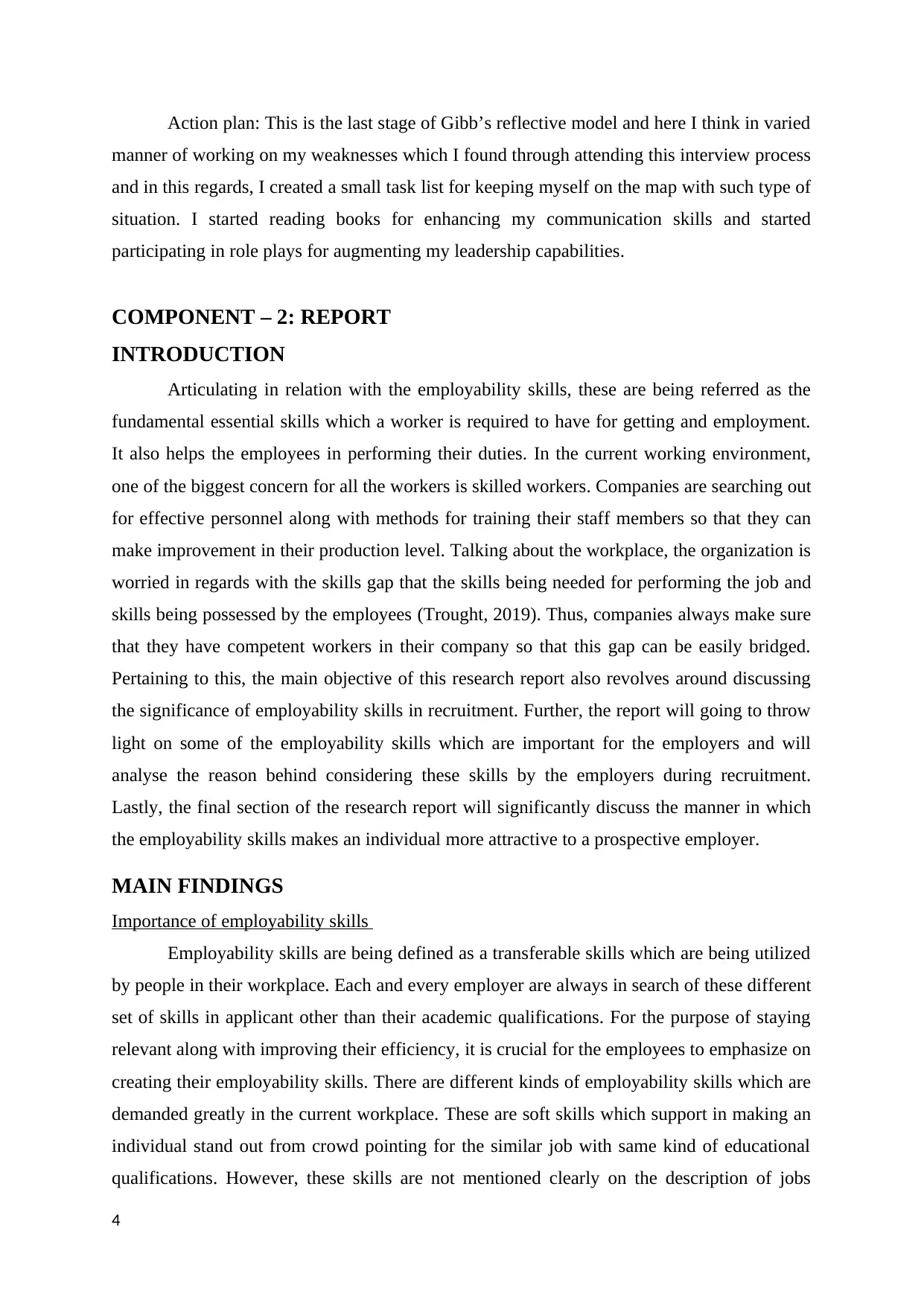
Action plan: This is the last stage of Gibb’s reflective model and here I think in varied
manner of working on my weaknesses which I found through attending this interview process
and in this regards, I created a small task list for keeping myself on the map with such type of
situation. I started reading books for enhancing my communication skills and started
participating in role plays for augmenting my leadership capabilities.
COMPONENT – 2: REPORT
INTRODUCTION
Articulating in relation with the employability skills, these are being referred as the
fundamental essential skills which a worker is required to have for getting and employment.
It also helps the employees in performing their duties. In the current working environment,
one of the biggest concern for all the workers is skilled workers. Companies are searching out
for effective personnel along with methods for training their staff members so that they can
make improvement in their production level. Talking about the workplace, the organization is
worried in regards with the skills gap that the skills being needed for performing the job and
skills being possessed by the employees (Trought, 2019). Thus, companies always make sure
that they have competent workers in their company so that this gap can be easily bridged.
Pertaining to this, the main objective of this research report also revolves around discussing
the significance of employability skills in recruitment. Further, the report will going to throw
light on some of the employability skills which are important for the employers and will
analyse the reason behind considering these skills by the employers during recruitment.
Lastly, the final section of the research report will significantly discuss the manner in which
the employability skills makes an individual more attractive to a prospective employer.
MAIN FINDINGS
Importance of employability skills
Employability skills are being defined as a transferable skills which are being utilized
by people in their workplace. Each and every employer are always in search of these different
set of skills in applicant other than their academic qualifications. For the purpose of staying
relevant along with improving their efficiency, it is crucial for the employees to emphasize on
creating their employability skills. There are different kinds of employability skills which are
demanded greatly in the current workplace. These are soft skills which support in making an
individual stand out from crowd pointing for the similar job with same kind of educational
qualifications. However, these skills are not mentioned clearly on the description of jobs
4
manner of working on my weaknesses which I found through attending this interview process
and in this regards, I created a small task list for keeping myself on the map with such type of
situation. I started reading books for enhancing my communication skills and started
participating in role plays for augmenting my leadership capabilities.
COMPONENT – 2: REPORT
INTRODUCTION
Articulating in relation with the employability skills, these are being referred as the
fundamental essential skills which a worker is required to have for getting and employment.
It also helps the employees in performing their duties. In the current working environment,
one of the biggest concern for all the workers is skilled workers. Companies are searching out
for effective personnel along with methods for training their staff members so that they can
make improvement in their production level. Talking about the workplace, the organization is
worried in regards with the skills gap that the skills being needed for performing the job and
skills being possessed by the employees (Trought, 2019). Thus, companies always make sure
that they have competent workers in their company so that this gap can be easily bridged.
Pertaining to this, the main objective of this research report also revolves around discussing
the significance of employability skills in recruitment. Further, the report will going to throw
light on some of the employability skills which are important for the employers and will
analyse the reason behind considering these skills by the employers during recruitment.
Lastly, the final section of the research report will significantly discuss the manner in which
the employability skills makes an individual more attractive to a prospective employer.
MAIN FINDINGS
Importance of employability skills
Employability skills are being defined as a transferable skills which are being utilized
by people in their workplace. Each and every employer are always in search of these different
set of skills in applicant other than their academic qualifications. For the purpose of staying
relevant along with improving their efficiency, it is crucial for the employees to emphasize on
creating their employability skills. There are different kinds of employability skills which are
demanded greatly in the current workplace. These are soft skills which support in making an
individual stand out from crowd pointing for the similar job with same kind of educational
qualifications. However, these skills are not mentioned clearly on the description of jobs
4
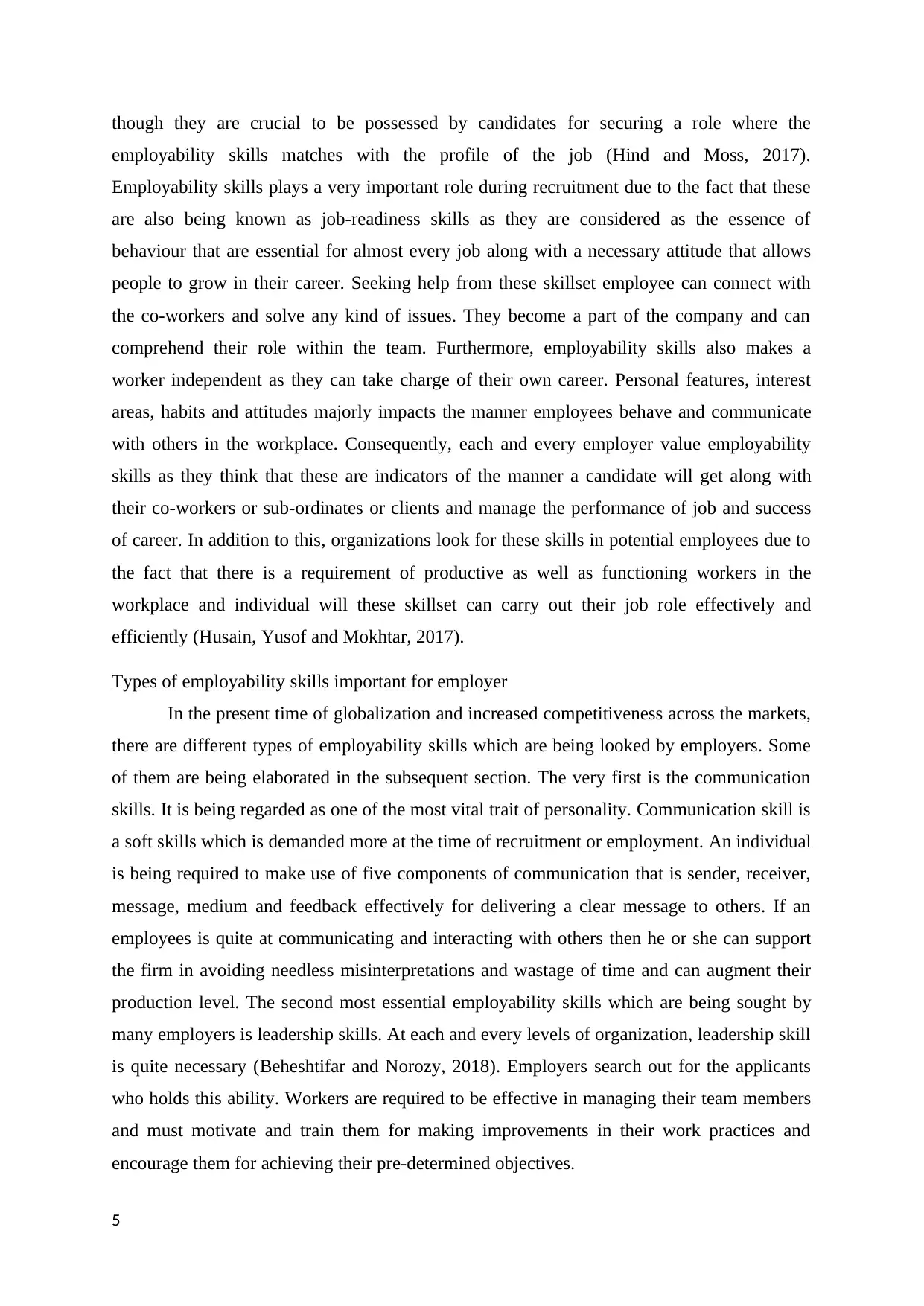
though they are crucial to be possessed by candidates for securing a role where the
employability skills matches with the profile of the job (Hind and Moss, 2017).
Employability skills plays a very important role during recruitment due to the fact that these
are also being known as job-readiness skills as they are considered as the essence of
behaviour that are essential for almost every job along with a necessary attitude that allows
people to grow in their career. Seeking help from these skillset employee can connect with
the co-workers and solve any kind of issues. They become a part of the company and can
comprehend their role within the team. Furthermore, employability skills also makes a
worker independent as they can take charge of their own career. Personal features, interest
areas, habits and attitudes majorly impacts the manner employees behave and communicate
with others in the workplace. Consequently, each and every employer value employability
skills as they think that these are indicators of the manner a candidate will get along with
their co-workers or sub-ordinates or clients and manage the performance of job and success
of career. In addition to this, organizations look for these skills in potential employees due to
the fact that there is a requirement of productive as well as functioning workers in the
workplace and individual will these skillset can carry out their job role effectively and
efficiently (Husain, Yusof and Mokhtar, 2017).
Types of employability skills important for employer
In the present time of globalization and increased competitiveness across the markets,
there are different types of employability skills which are being looked by employers. Some
of them are being elaborated in the subsequent section. The very first is the communication
skills. It is being regarded as one of the most vital trait of personality. Communication skill is
a soft skills which is demanded more at the time of recruitment or employment. An individual
is being required to make use of five components of communication that is sender, receiver,
message, medium and feedback effectively for delivering a clear message to others. If an
employees is quite at communicating and interacting with others then he or she can support
the firm in avoiding needless misinterpretations and wastage of time and can augment their
production level. The second most essential employability skills which are being sought by
many employers is leadership skills. At each and every levels of organization, leadership skill
is quite necessary (Beheshtifar and Norozy, 2018). Employers search out for the applicants
who holds this ability. Workers are required to be effective in managing their team members
and must motivate and train them for making improvements in their work practices and
encourage them for achieving their pre-determined objectives.
5
employability skills matches with the profile of the job (Hind and Moss, 2017).
Employability skills plays a very important role during recruitment due to the fact that these
are also being known as job-readiness skills as they are considered as the essence of
behaviour that are essential for almost every job along with a necessary attitude that allows
people to grow in their career. Seeking help from these skillset employee can connect with
the co-workers and solve any kind of issues. They become a part of the company and can
comprehend their role within the team. Furthermore, employability skills also makes a
worker independent as they can take charge of their own career. Personal features, interest
areas, habits and attitudes majorly impacts the manner employees behave and communicate
with others in the workplace. Consequently, each and every employer value employability
skills as they think that these are indicators of the manner a candidate will get along with
their co-workers or sub-ordinates or clients and manage the performance of job and success
of career. In addition to this, organizations look for these skills in potential employees due to
the fact that there is a requirement of productive as well as functioning workers in the
workplace and individual will these skillset can carry out their job role effectively and
efficiently (Husain, Yusof and Mokhtar, 2017).
Types of employability skills important for employer
In the present time of globalization and increased competitiveness across the markets,
there are different types of employability skills which are being looked by employers. Some
of them are being elaborated in the subsequent section. The very first is the communication
skills. It is being regarded as one of the most vital trait of personality. Communication skill is
a soft skills which is demanded more at the time of recruitment or employment. An individual
is being required to make use of five components of communication that is sender, receiver,
message, medium and feedback effectively for delivering a clear message to others. If an
employees is quite at communicating and interacting with others then he or she can support
the firm in avoiding needless misinterpretations and wastage of time and can augment their
production level. The second most essential employability skills which are being sought by
many employers is leadership skills. At each and every levels of organization, leadership skill
is quite necessary (Beheshtifar and Norozy, 2018). Employers search out for the applicants
who holds this ability. Workers are required to be effective in managing their team members
and must motivate and train them for making improvements in their work practices and
encourage them for achieving their pre-determined objectives.
5
Paraphrase This Document
Need a fresh take? Get an instant paraphrase of this document with our AI Paraphraser
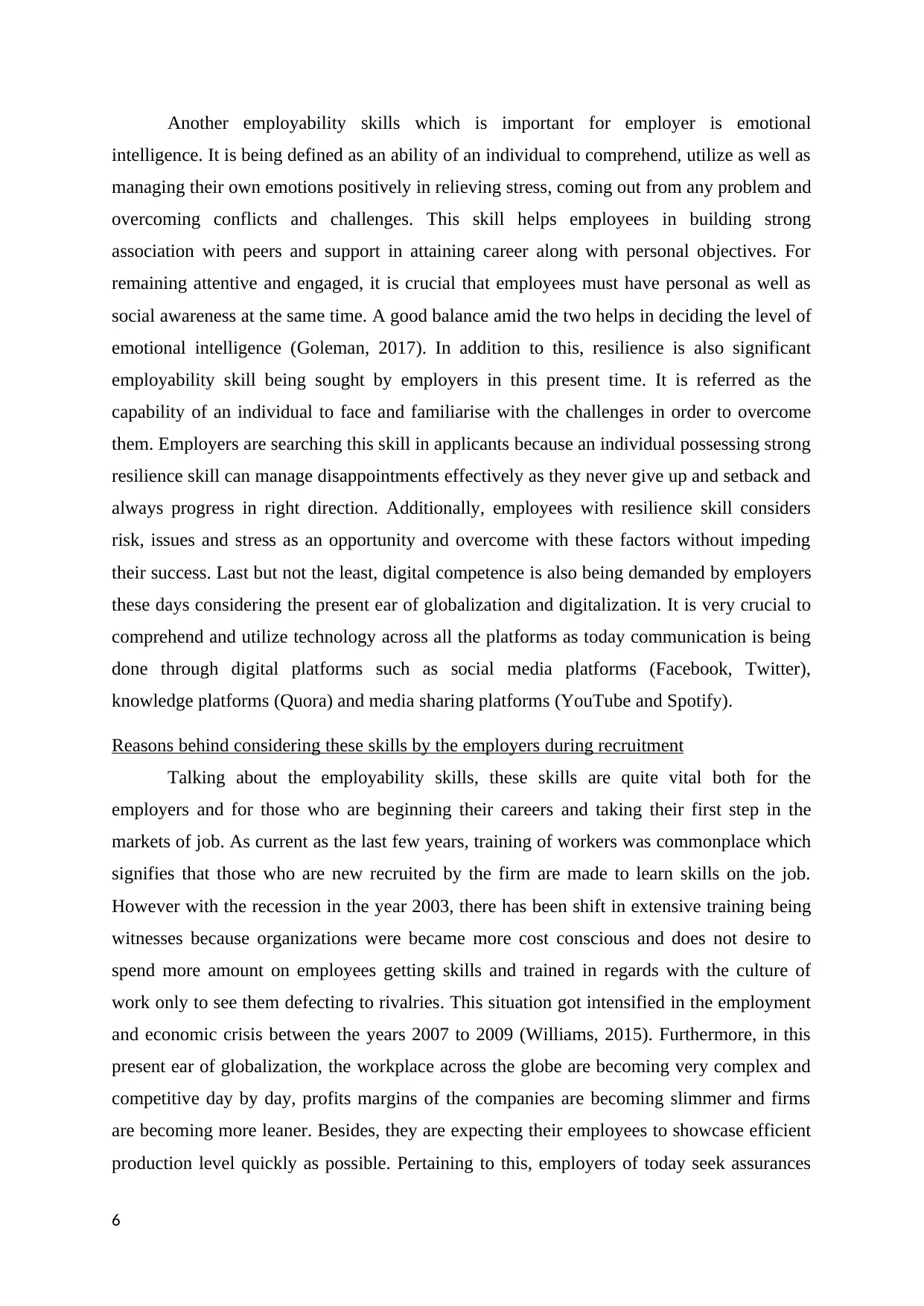
Another employability skills which is important for employer is emotional
intelligence. It is being defined as an ability of an individual to comprehend, utilize as well as
managing their own emotions positively in relieving stress, coming out from any problem and
overcoming conflicts and challenges. This skill helps employees in building strong
association with peers and support in attaining career along with personal objectives. For
remaining attentive and engaged, it is crucial that employees must have personal as well as
social awareness at the same time. A good balance amid the two helps in deciding the level of
emotional intelligence (Goleman, 2017). In addition to this, resilience is also significant
employability skill being sought by employers in this present time. It is referred as the
capability of an individual to face and familiarise with the challenges in order to overcome
them. Employers are searching this skill in applicants because an individual possessing strong
resilience skill can manage disappointments effectively as they never give up and setback and
always progress in right direction. Additionally, employees with resilience skill considers
risk, issues and stress as an opportunity and overcome with these factors without impeding
their success. Last but not the least, digital competence is also being demanded by employers
these days considering the present ear of globalization and digitalization. It is very crucial to
comprehend and utilize technology across all the platforms as today communication is being
done through digital platforms such as social media platforms (Facebook, Twitter),
knowledge platforms (Quora) and media sharing platforms (YouTube and Spotify).
Reasons behind considering these skills by the employers during recruitment
Talking about the employability skills, these skills are quite vital both for the
employers and for those who are beginning their careers and taking their first step in the
markets of job. As current as the last few years, training of workers was commonplace which
signifies that those who are new recruited by the firm are made to learn skills on the job.
However with the recession in the year 2003, there has been shift in extensive training being
witnesses because organizations were became more cost conscious and does not desire to
spend more amount on employees getting skills and trained in regards with the culture of
work only to see them defecting to rivalries. This situation got intensified in the employment
and economic crisis between the years 2007 to 2009 (Williams, 2015). Furthermore, in this
present ear of globalization, the workplace across the globe are becoming very complex and
competitive day by day, profits margins of the companies are becoming slimmer and firms
are becoming more leaner. Besides, they are expecting their employees to showcase efficient
production level quickly as possible. Pertaining to this, employers of today seek assurances
6
intelligence. It is being defined as an ability of an individual to comprehend, utilize as well as
managing their own emotions positively in relieving stress, coming out from any problem and
overcoming conflicts and challenges. This skill helps employees in building strong
association with peers and support in attaining career along with personal objectives. For
remaining attentive and engaged, it is crucial that employees must have personal as well as
social awareness at the same time. A good balance amid the two helps in deciding the level of
emotional intelligence (Goleman, 2017). In addition to this, resilience is also significant
employability skill being sought by employers in this present time. It is referred as the
capability of an individual to face and familiarise with the challenges in order to overcome
them. Employers are searching this skill in applicants because an individual possessing strong
resilience skill can manage disappointments effectively as they never give up and setback and
always progress in right direction. Additionally, employees with resilience skill considers
risk, issues and stress as an opportunity and overcome with these factors without impeding
their success. Last but not the least, digital competence is also being demanded by employers
these days considering the present ear of globalization and digitalization. It is very crucial to
comprehend and utilize technology across all the platforms as today communication is being
done through digital platforms such as social media platforms (Facebook, Twitter),
knowledge platforms (Quora) and media sharing platforms (YouTube and Spotify).
Reasons behind considering these skills by the employers during recruitment
Talking about the employability skills, these skills are quite vital both for the
employers and for those who are beginning their careers and taking their first step in the
markets of job. As current as the last few years, training of workers was commonplace which
signifies that those who are new recruited by the firm are made to learn skills on the job.
However with the recession in the year 2003, there has been shift in extensive training being
witnesses because organizations were became more cost conscious and does not desire to
spend more amount on employees getting skills and trained in regards with the culture of
work only to see them defecting to rivalries. This situation got intensified in the employment
and economic crisis between the years 2007 to 2009 (Williams, 2015). Furthermore, in this
present ear of globalization, the workplace across the globe are becoming very complex and
competitive day by day, profits margins of the companies are becoming slimmer and firms
are becoming more leaner. Besides, they are expecting their employees to showcase efficient
production level quickly as possible. Pertaining to this, employers of today seek assurances
6
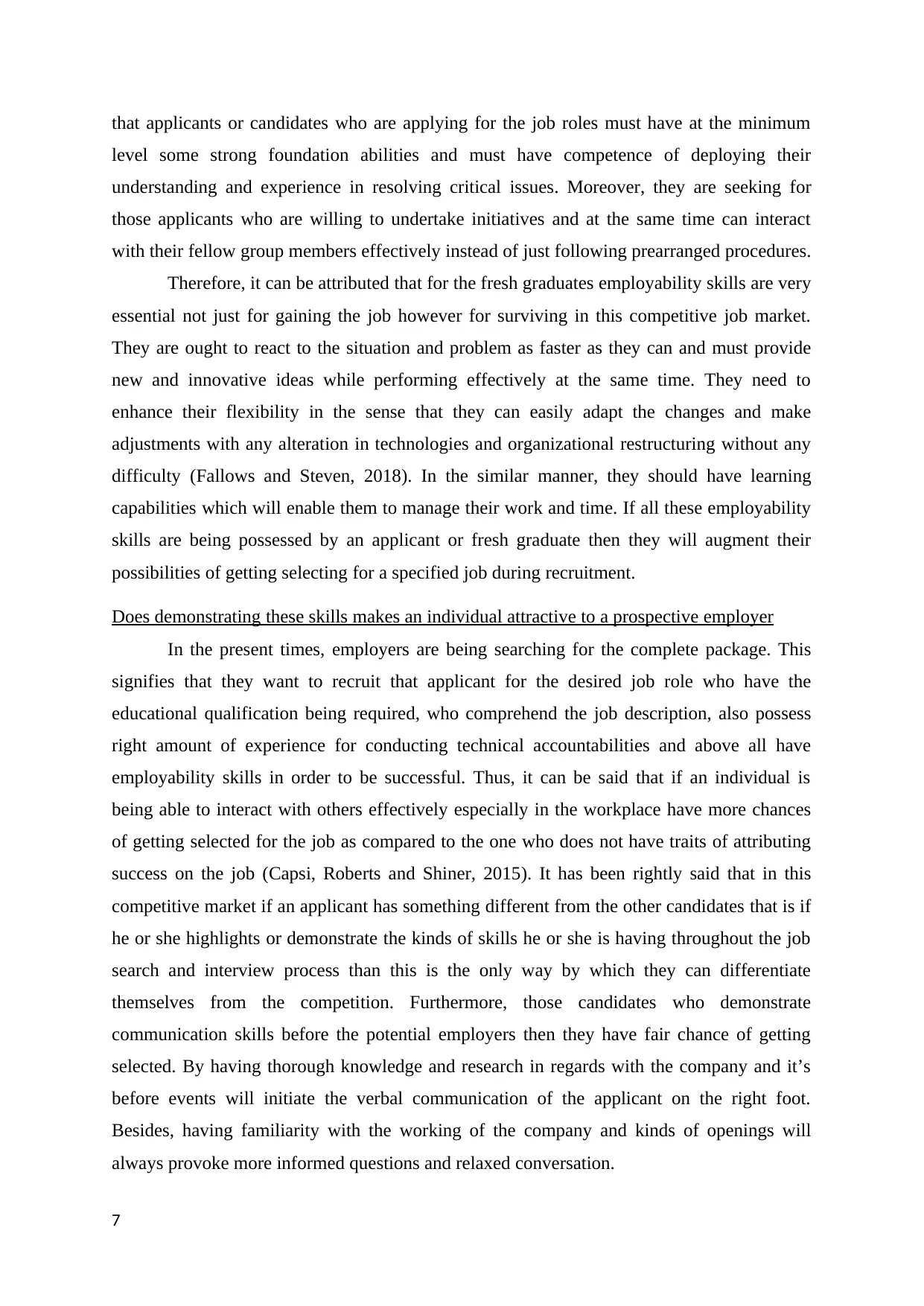
that applicants or candidates who are applying for the job roles must have at the minimum
level some strong foundation abilities and must have competence of deploying their
understanding and experience in resolving critical issues. Moreover, they are seeking for
those applicants who are willing to undertake initiatives and at the same time can interact
with their fellow group members effectively instead of just following prearranged procedures.
Therefore, it can be attributed that for the fresh graduates employability skills are very
essential not just for gaining the job however for surviving in this competitive job market.
They are ought to react to the situation and problem as faster as they can and must provide
new and innovative ideas while performing effectively at the same time. They need to
enhance their flexibility in the sense that they can easily adapt the changes and make
adjustments with any alteration in technologies and organizational restructuring without any
difficulty (Fallows and Steven, 2018). In the similar manner, they should have learning
capabilities which will enable them to manage their work and time. If all these employability
skills are being possessed by an applicant or fresh graduate then they will augment their
possibilities of getting selecting for a specified job during recruitment.
Does demonstrating these skills makes an individual attractive to a prospective employer
In the present times, employers are being searching for the complete package. This
signifies that they want to recruit that applicant for the desired job role who have the
educational qualification being required, who comprehend the job description, also possess
right amount of experience for conducting technical accountabilities and above all have
employability skills in order to be successful. Thus, it can be said that if an individual is
being able to interact with others effectively especially in the workplace have more chances
of getting selected for the job as compared to the one who does not have traits of attributing
success on the job (Capsi, Roberts and Shiner, 2015). It has been rightly said that in this
competitive market if an applicant has something different from the other candidates that is if
he or she highlights or demonstrate the kinds of skills he or she is having throughout the job
search and interview process than this is the only way by which they can differentiate
themselves from the competition. Furthermore, those candidates who demonstrate
communication skills before the potential employers then they have fair chance of getting
selected. By having thorough knowledge and research in regards with the company and it’s
before events will initiate the verbal communication of the applicant on the right foot.
Besides, having familiarity with the working of the company and kinds of openings will
always provoke more informed questions and relaxed conversation.
7
level some strong foundation abilities and must have competence of deploying their
understanding and experience in resolving critical issues. Moreover, they are seeking for
those applicants who are willing to undertake initiatives and at the same time can interact
with their fellow group members effectively instead of just following prearranged procedures.
Therefore, it can be attributed that for the fresh graduates employability skills are very
essential not just for gaining the job however for surviving in this competitive job market.
They are ought to react to the situation and problem as faster as they can and must provide
new and innovative ideas while performing effectively at the same time. They need to
enhance their flexibility in the sense that they can easily adapt the changes and make
adjustments with any alteration in technologies and organizational restructuring without any
difficulty (Fallows and Steven, 2018). In the similar manner, they should have learning
capabilities which will enable them to manage their work and time. If all these employability
skills are being possessed by an applicant or fresh graduate then they will augment their
possibilities of getting selecting for a specified job during recruitment.
Does demonstrating these skills makes an individual attractive to a prospective employer
In the present times, employers are being searching for the complete package. This
signifies that they want to recruit that applicant for the desired job role who have the
educational qualification being required, who comprehend the job description, also possess
right amount of experience for conducting technical accountabilities and above all have
employability skills in order to be successful. Thus, it can be said that if an individual is
being able to interact with others effectively especially in the workplace have more chances
of getting selected for the job as compared to the one who does not have traits of attributing
success on the job (Capsi, Roberts and Shiner, 2015). It has been rightly said that in this
competitive market if an applicant has something different from the other candidates that is if
he or she highlights or demonstrate the kinds of skills he or she is having throughout the job
search and interview process than this is the only way by which they can differentiate
themselves from the competition. Furthermore, those candidates who demonstrate
communication skills before the potential employers then they have fair chance of getting
selected. By having thorough knowledge and research in regards with the company and it’s
before events will initiate the verbal communication of the applicant on the right foot.
Besides, having familiarity with the working of the company and kinds of openings will
always provoke more informed questions and relaxed conversation.
7
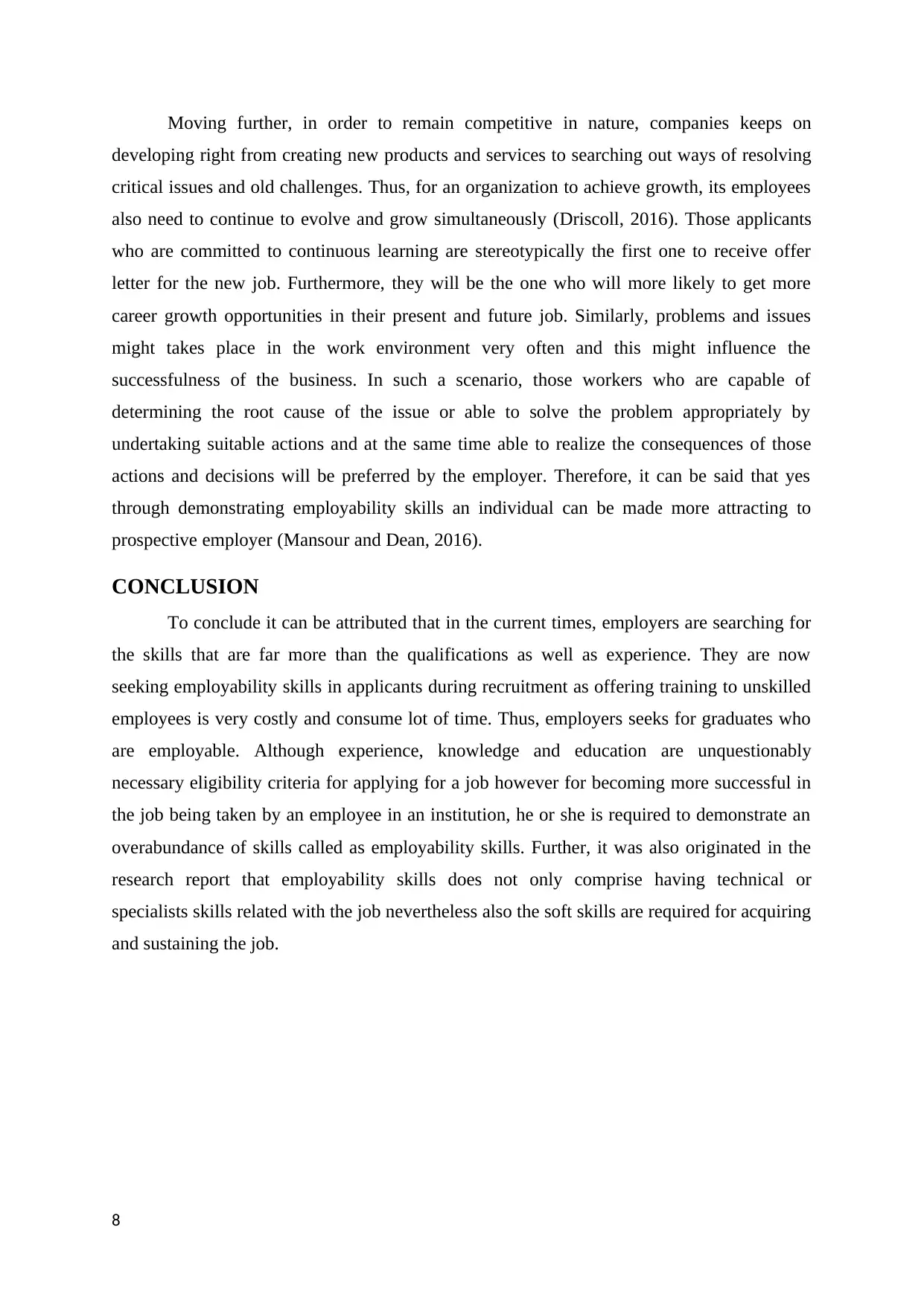
Moving further, in order to remain competitive in nature, companies keeps on
developing right from creating new products and services to searching out ways of resolving
critical issues and old challenges. Thus, for an organization to achieve growth, its employees
also need to continue to evolve and grow simultaneously (Driscoll, 2016). Those applicants
who are committed to continuous learning are stereotypically the first one to receive offer
letter for the new job. Furthermore, they will be the one who will more likely to get more
career growth opportunities in their present and future job. Similarly, problems and issues
might takes place in the work environment very often and this might influence the
successfulness of the business. In such a scenario, those workers who are capable of
determining the root cause of the issue or able to solve the problem appropriately by
undertaking suitable actions and at the same time able to realize the consequences of those
actions and decisions will be preferred by the employer. Therefore, it can be said that yes
through demonstrating employability skills an individual can be made more attracting to
prospective employer (Mansour and Dean, 2016).
CONCLUSION
To conclude it can be attributed that in the current times, employers are searching for
the skills that are far more than the qualifications as well as experience. They are now
seeking employability skills in applicants during recruitment as offering training to unskilled
employees is very costly and consume lot of time. Thus, employers seeks for graduates who
are employable. Although experience, knowledge and education are unquestionably
necessary eligibility criteria for applying for a job however for becoming more successful in
the job being taken by an employee in an institution, he or she is required to demonstrate an
overabundance of skills called as employability skills. Further, it was also originated in the
research report that employability skills does not only comprise having technical or
specialists skills related with the job nevertheless also the soft skills are required for acquiring
and sustaining the job.
8
developing right from creating new products and services to searching out ways of resolving
critical issues and old challenges. Thus, for an organization to achieve growth, its employees
also need to continue to evolve and grow simultaneously (Driscoll, 2016). Those applicants
who are committed to continuous learning are stereotypically the first one to receive offer
letter for the new job. Furthermore, they will be the one who will more likely to get more
career growth opportunities in their present and future job. Similarly, problems and issues
might takes place in the work environment very often and this might influence the
successfulness of the business. In such a scenario, those workers who are capable of
determining the root cause of the issue or able to solve the problem appropriately by
undertaking suitable actions and at the same time able to realize the consequences of those
actions and decisions will be preferred by the employer. Therefore, it can be said that yes
through demonstrating employability skills an individual can be made more attracting to
prospective employer (Mansour and Dean, 2016).
CONCLUSION
To conclude it can be attributed that in the current times, employers are searching for
the skills that are far more than the qualifications as well as experience. They are now
seeking employability skills in applicants during recruitment as offering training to unskilled
employees is very costly and consume lot of time. Thus, employers seeks for graduates who
are employable. Although experience, knowledge and education are unquestionably
necessary eligibility criteria for applying for a job however for becoming more successful in
the job being taken by an employee in an institution, he or she is required to demonstrate an
overabundance of skills called as employability skills. Further, it was also originated in the
research report that employability skills does not only comprise having technical or
specialists skills related with the job nevertheless also the soft skills are required for acquiring
and sustaining the job.
8
Secure Best Marks with AI Grader
Need help grading? Try our AI Grader for instant feedback on your assignments.
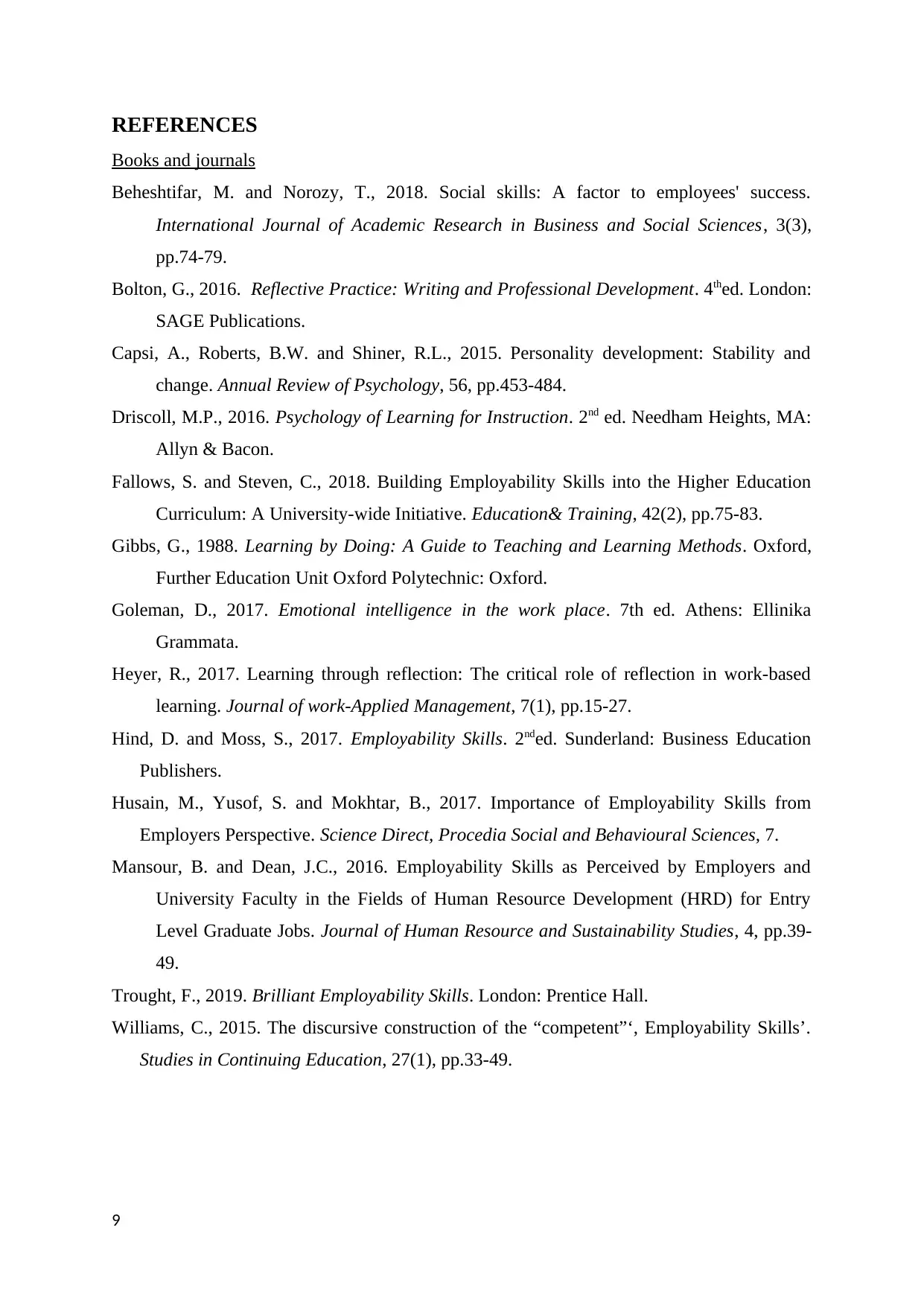
REFERENCES
Books and journals
Beheshtifar, M. and Norozy, T., 2018. Social skills: A factor to employees' success.
International Journal of Academic Research in Business and Social Sciences, 3(3),
pp.74-79.
Bolton, G., 2016. Reflective Practice: Writing and Professional Development. 4thed. London:
SAGE Publications.
Capsi, A., Roberts, B.W. and Shiner, R.L., 2015. Personality development: Stability and
change. Annual Review of Psychology, 56, pp.453-484.
Driscoll, M.P., 2016. Psychology of Learning for Instruction. 2nd ed. Needham Heights, MA:
Allyn & Bacon.
Fallows, S. and Steven, C., 2018. Building Employability Skills into the Higher Education
Curriculum: A University-wide Initiative. Education& Training, 42(2), pp.75-83.
Gibbs, G., 1988. Learning by Doing: A Guide to Teaching and Learning Methods. Oxford,
Further Education Unit Oxford Polytechnic: Oxford.
Goleman, D., 2017. Emotional intelligence in the work place. 7th ed. Athens: Ellinika
Grammata.
Heyer, R., 2017. Learning through reflection: The critical role of reflection in work-based
learning. Journal of work-Applied Management, 7(1), pp.15-27.
Hind, D. and Moss, S., 2017. Employability Skills. 2nded. Sunderland: Business Education
Publishers.
Husain, M., Yusof, S. and Mokhtar, B., 2017. Importance of Employability Skills from
Employers Perspective. Science Direct, Procedia Social and Behavioural Sciences, 7.
Mansour, B. and Dean, J.C., 2016. Employability Skills as Perceived by Employers and
University Faculty in the Fields of Human Resource Development (HRD) for Entry
Level Graduate Jobs. Journal of Human Resource and Sustainability Studies, 4, pp.39-
49.
Trought, F., 2019. Brilliant Employability Skills. London: Prentice Hall.
Williams, C., 2015. The discursive construction of the “competent”‘, Employability Skills’.
Studies in Continuing Education, 27(1), pp.33-49.
9
Books and journals
Beheshtifar, M. and Norozy, T., 2018. Social skills: A factor to employees' success.
International Journal of Academic Research in Business and Social Sciences, 3(3),
pp.74-79.
Bolton, G., 2016. Reflective Practice: Writing and Professional Development. 4thed. London:
SAGE Publications.
Capsi, A., Roberts, B.W. and Shiner, R.L., 2015. Personality development: Stability and
change. Annual Review of Psychology, 56, pp.453-484.
Driscoll, M.P., 2016. Psychology of Learning for Instruction. 2nd ed. Needham Heights, MA:
Allyn & Bacon.
Fallows, S. and Steven, C., 2018. Building Employability Skills into the Higher Education
Curriculum: A University-wide Initiative. Education& Training, 42(2), pp.75-83.
Gibbs, G., 1988. Learning by Doing: A Guide to Teaching and Learning Methods. Oxford,
Further Education Unit Oxford Polytechnic: Oxford.
Goleman, D., 2017. Emotional intelligence in the work place. 7th ed. Athens: Ellinika
Grammata.
Heyer, R., 2017. Learning through reflection: The critical role of reflection in work-based
learning. Journal of work-Applied Management, 7(1), pp.15-27.
Hind, D. and Moss, S., 2017. Employability Skills. 2nded. Sunderland: Business Education
Publishers.
Husain, M., Yusof, S. and Mokhtar, B., 2017. Importance of Employability Skills from
Employers Perspective. Science Direct, Procedia Social and Behavioural Sciences, 7.
Mansour, B. and Dean, J.C., 2016. Employability Skills as Perceived by Employers and
University Faculty in the Fields of Human Resource Development (HRD) for Entry
Level Graduate Jobs. Journal of Human Resource and Sustainability Studies, 4, pp.39-
49.
Trought, F., 2019. Brilliant Employability Skills. London: Prentice Hall.
Williams, C., 2015. The discursive construction of the “competent”‘, Employability Skills’.
Studies in Continuing Education, 27(1), pp.33-49.
9
1 out of 11
Your All-in-One AI-Powered Toolkit for Academic Success.
+13062052269
info@desklib.com
Available 24*7 on WhatsApp / Email
![[object Object]](/_next/static/media/star-bottom.7253800d.svg)
Unlock your academic potential
© 2024 | Zucol Services PVT LTD | All rights reserved.




